Best
Heavy-Duty Strings
-
Overall: 8/10
-
Best Feature: High output delivered by nickel-plated windings
-
TedScore™: 8/10
Best Strings
for Rockstars
-
Overall: 9/10
-
Best Feature: Incredible durability fights
-
TedScore™: 9/10
Best Long
Lasting Strings
-
Overall: 8.5/10
-
Best Feature: A detailed, glistening tone promises a magical gig
-
TedScore™: 8.5/10
Are you tired of your guitar strings breaking on you mid-solo? Or maybe you want to add some extra sparkle to your sound?
Well, have no fear because I’m here to settle the age-old debate: Coated versus uncoated guitar strings!
Coated strings are like the superheroes of the string world, with a special polymer coating that protects against rust and wear and tear.
On the other hand, uncoated strings are like the free-spirited hippies of the guitar world, with a more natural feel and sound.
So which is the ultimate winner?
Let’s find out…
Coated vs Uncoated Guitar Strings: Which One is Right for You?
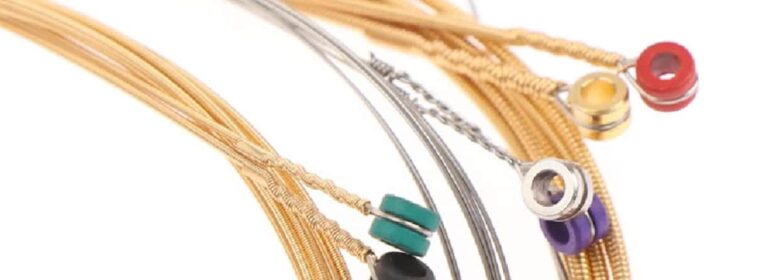
Choosing between coated and uncoated guitar strings comes down to personal preference.
If you want to enhance your sound and extend the lifespan of your strings, coated options are a great choice.
However, uncoated strings may be your better option if you prefer a more organic tone and longer sustain.
Let’s look deeper into these two types of strings:
Coated Strings
Coated strings are normal strings with a thin layer of polymer coating that can be applied on the wrap wire, core wire, or the entire string.
The main benefit of coated strings is their corrosion-resistant properties.
This section will explore when coated guitar strings are best used, their benefits, and drawbacks.
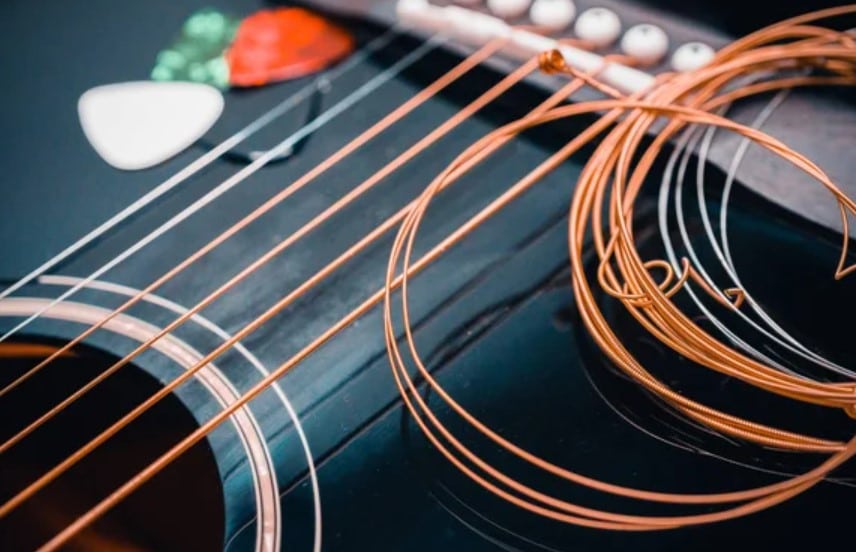
When are Coated Guitar Strings Best Used?
Coated guitar strings are best used when you want to prolong the life of your strings without sacrificing tone.
Coated strings may be a good option if you play frequently or your hands sweat a lot. They’re also ideal for players who want to improve their sound and tone while ensuring longevity for their set.
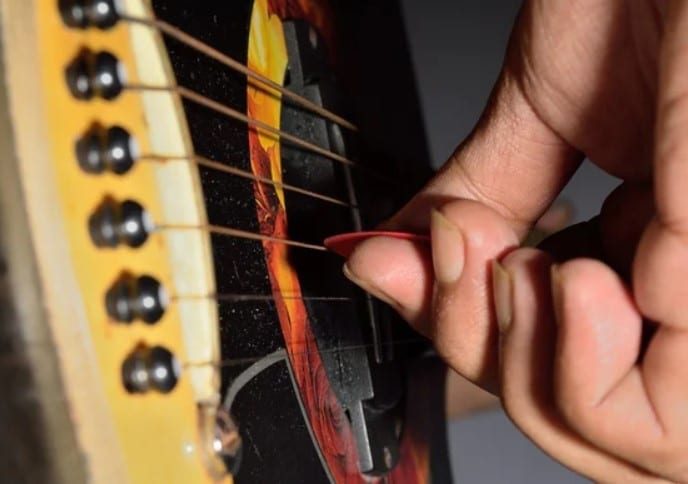
Benefits of Coated Guitar Strings
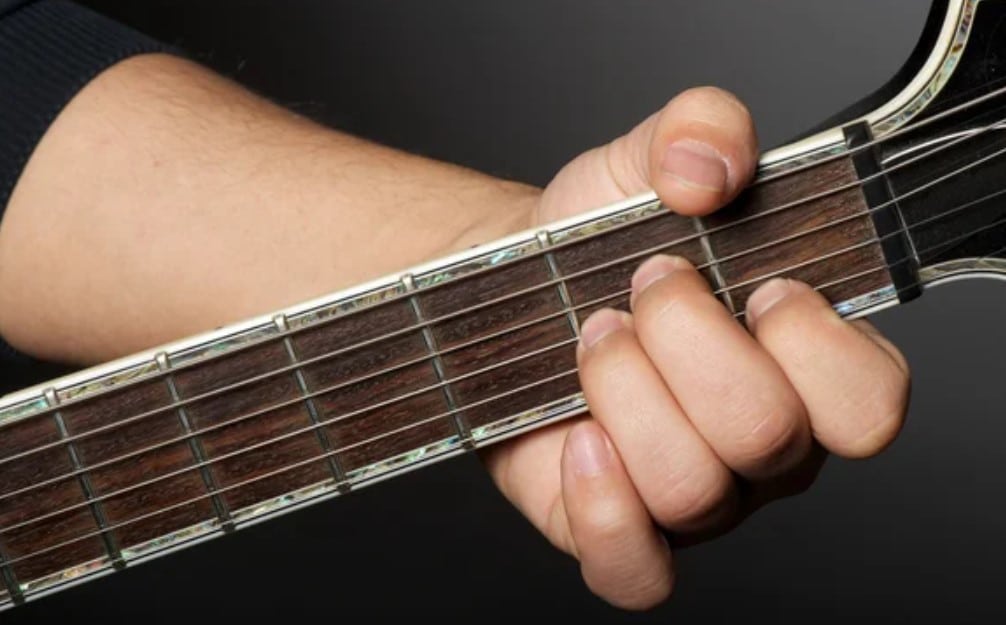
The main benefit of coated guitar strings is their longevity. Coated strings can last 3-5 times longer than uncoated strings. This means you won’t have to change your strings as often, saving you time and money in the long run.
Coated strings are also slippery, benefiting players who like to slide their fingers up and down the fretboard. The polymer coating also helps reduce fret wear and tear, which can extend the life of your guitar.
Drawbacks of Coated Guitar Strings
One of the main drawbacks of coated guitar strings is their cost.
Coated strings are generally more expensive than uncoated strings. Additionally, some players may not like the slippery feel of coated strings, which can take some getting used to.
Finally, coated strings can sometimes sound dull compared to uncoated strings, although this is not always true.
Best Coated Strings for Your Guitar
Elixir 12052 NANOWEB Light Electric Guitar Strings, 10-46
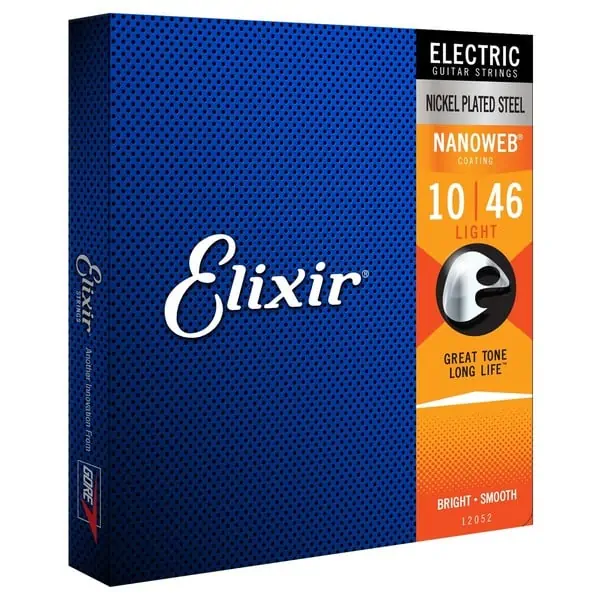
FEATURES: -A detailed, glistening
tone promises a magical gig
-Brilliant presence and
punch make for glistening articulation
-Exceptional durability
courtesy of an ultra-thin coating
-Comfortable and easy to play thanks to a
wonderfully smooth feel
- Elixir strings offer a smoother feel and reduces finger squeaks
- Provides great playability
- Available in .010, .013, .017, .026, .036, .046 gauges
- The price is higher than many other options on the market
When you click ‘Check Price’, you’ll see there are loads of great places to buy this item. Our personal favorite is Sweetwater for the US, and Thomann and Gear4Music for the UK & Europe.
They are the largest music retailers, with excellent customer service, competitive prices, really fast shipping, and the longest guarantees.
The professional musician who wrote this article combined many things,
from the product build, manufacturer’s reputation through to feedback
from other users, to create our famous TedScore™.
Fender 250L NPS Ball End Guitar Strings, 9-42
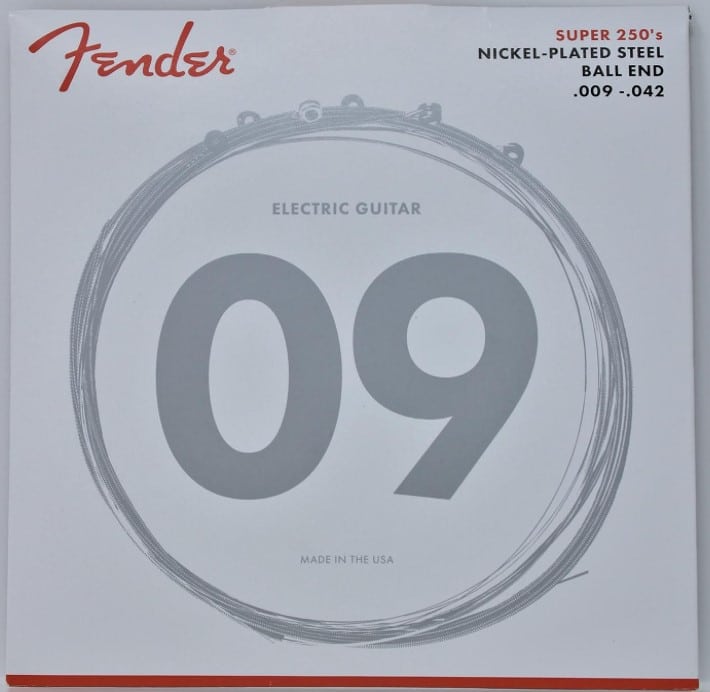
FEATURES: -Constructed with nickel-plated steel
-Ball end design
-Light gauges: .009 .011 .016 .024 .032 .042
- Produces a bright and clear tone
- Easy to play
- With good sustain
- Not ideal for heavy playing styles
When you click ‘Check Price’, you’ll see there are loads of great places to buy this item. Our personal favorite is Sweetwater for the US, and Thomann and Gear4Music for the UK & Europe.
They are the largest music retailers, with excellent customer service, competitive prices, really fast shipping, and the longest guarantees.
The professional musician who wrote this article combined many things,
from the product build, manufacturer’s reputation through to feedback
from other users, to create our famous TedScore™.
D'Addario XS Nickel Coated Electric Guitar Strings, 11-49, Medium
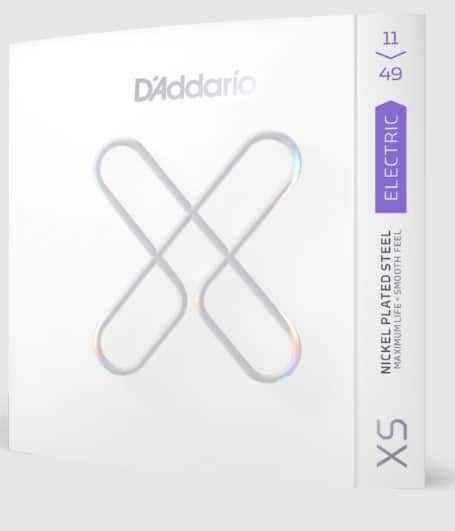
FEATURES: -Play with stability thanks to
a steel high carbon core
-Increased output with reformulated
nickel-plated steel
-Coated with D'Addario's
proprietary fusion twist technology
- Complete protection with new guitar string windings
- Smooth, fast feel with ultra-thin film coating
- Available in gauges .11, .14, .18, .28, .38, .49
- The price point is higher than many other options on the market
When you click ‘Check Price’, you’ll see there are loads of great places to buy this item. Our personal favorite is Sweetwater for the US, and Thomann and Gear4Music for the UK & Europe.
They are the largest music retailers, with excellent customer service, competitive prices, really fast shipping, and the longest guarantees.
The professional musician who wrote this article combined many things,
from the product build, manufacturer’s reputation through to feedback
from other users, to create our famous TedScore™.
Uncoated Strings
When it comes to guitar strings, uncoated strings are the traditional choice.
They’re made from steel, producing a natural sound that many guitarists prefer. Uncoated strings are also known for their sustain, which is the length of time that a note continues to ring after it’s played.
When are Uncoated Guitar Strings Best Use?
Uncoated guitar strings are best used when you want a traditional sound from your guitar.
They’re also a good choice if you are looking for strings that are easy to maintain. Uncoated strings require less maintenance than coated strings, which can be a big advantage if you play your guitar frequently.
Benefits of Uncoated Guitar Strings
One of the biggest benefits of uncoated guitar strings is their natural sound. They produce a warm, rich tone that many guitarists love.
Uncoated strings are also known for their sustain, meaning that notes will continue to ring long after playing.
Another benefit of uncoated strings is that they are easy to maintain. They don’t require special treatment and can be cleaned with a simple cloth. This makes them a good choice for guitarists who don’t want to spend much time maintaining their strings.
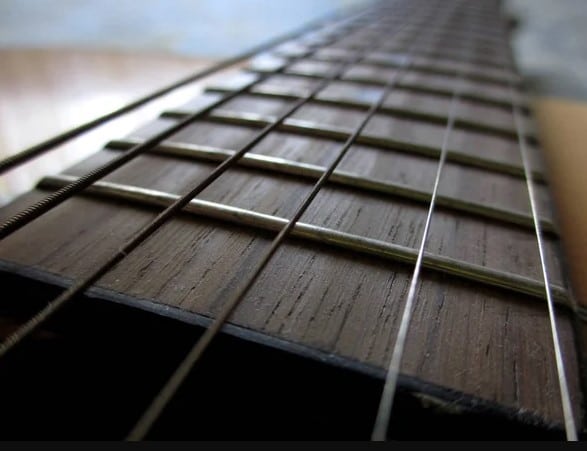
Drawbacks of Uncoated Guitar Strings
The main drawback of uncoated guitar strings is that they are more prone to corrosion than coated strings.
This means that they may not last as long as coated strings, especially if you live in a humid environment.
Uncoated strings are also more prone to breakage than coated strings,
Which can be frustrating if you play your guitar frequently.

Best Uncoated Strings for Your Guitar
D'Addario NYXL1149 Nickel Wound Electric Guitar Strings, Medium, 11-49
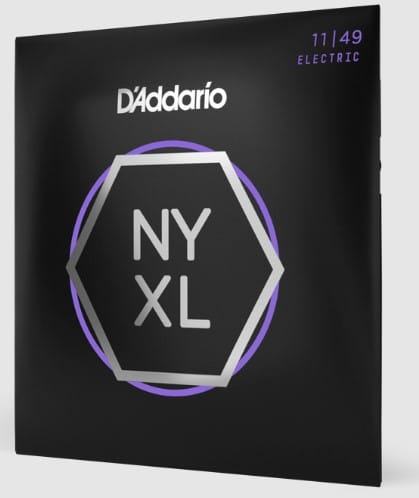
FEATURES: -High output delivered by nickel-plated windings
-Excellent strength to last performances to
come with high carbon steel
-Enhanced tuning stability to ensure you always
sound pitch perfect
- Designed to accommodate a range of styles and techniques
- Ideal for guitarists who want to achieve a full and beefy tone
- Some players may find that the high tension of these strings can be more difficult to play
When you click ‘Check Price’, you’ll see there are loads of great places to buy this item. Our personal favorite is Sweetwater for the US, and Thomann and Gear4Music for the UK & Europe.
They are the largest music retailers, with excellent customer service, competitive prices, really fast shipping, and the longest guarantees.
The professional musician who wrote this article combined many things,
from the product build, manufacturer’s reputation through to feedback
from other users, to create our famous TedScore™.
Ernie Ball Regular Slinky 2221 Nickel Electric Guitar Strings 10-46
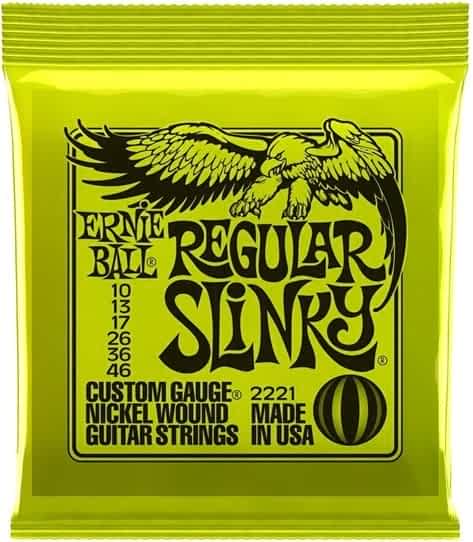
FEATURES: -Play with aggression and passion with its nickel construction
-Incredible durability fights
against wear and tear for as long as possible
- Offers unwavering quality
- Promises clear, dynamic sound as well as brilliant robustness
- With Element Shield packaging, which protects them against humidity
- Some players may find that the nickel plating can wear off over time
When you click ‘Check Price’, you’ll see there are loads of great places to buy this item. Our personal favorite is Sweetwater for the US, and Thomann and Gear4Music for the UK & Europe.
They are the largest music retailers, with excellent customer service, competitive prices, really fast shipping, and the longest guarantees.
The professional musician who wrote this article combined many things,
from the product build, manufacturer’s reputation through to feedback
from other users, to create our famous TedScore™.
GHS Boomers Guitar Strings Light 10-46

FEATURES: -Round-wound strings and nickel-plated steel wire provides a bright and punchy tone
-Hex core design also contributes to their bright and lively sound
- A popular choice for rock and metal players
- Provides increased tuning stability and durability
- Easy to play and bend
- The bright tone of these strings can be too harsh or abrasive for certain playing styles or musical genres
When you click ‘Check Price’, you’ll see there are loads of great places to buy this item. Our personal favorite is Sweetwater for the US, and Thomann and Gear4Music for the UK & Europe.
They are the largest music retailers, with excellent customer service, competitive prices, really fast shipping, and the longest guarantees.
The professional musician who wrote this article combined many things,
from the product build, manufacturer’s reputation through to feedback
from other users, to create our famous TedScore™.
More Tips on How to Choose Between Coated and Uncoated Guitar Strings
When choosing between coated and uncoated guitar strings, personal preference and playing style are two of the most important factors.
Here are some tips and tricks to keep in mind:
Coated strings last longer than uncoated strings, making them a good choice for players who don’t want to change strings frequently.
Coated strings may also offer better corrosion resistance, which can be important if you live in a humid or salty environment.
Uncoated strings generally have a brighter, more natural tone, which some players prefer.
Coated strings may have a slightly warmer or darker tone, which can be desirable in certain playing situations.
Maintaining Your Guitar Strings
No matter which type of guitar strings you choose, it’s important to maintain them properly to ensure they last as long as possible.
Here are some tips to help you keep your guitar strings in top condition:
Always wash your hands before playing to prevent dirt and oil from building up on the strings.
Coated strings may also offer better corrosion resistance, which can be important if you live in a humid or salty environment.
Avoid exposing your guitar to extreme temperatures or humidity, which can cause the strings to deteriorate more quickly.
Coated strings may have a slightly warmer or darker tone, which can be desirable in certain playing situations.
Coated Vs Uncoated Guitar Strings
A Recap
Now that you have learned the differences between coated and uncoated guitar strings, you may wonder which one is right for you.
Ultimately, it comes down to personal preference and the sound you’re trying to achieve.
I’ve used both over the years, and every year I flip between what is best! Call me undecided, but I like to continue to experiment and try new things…
Coated strings are treated with a thin layer of polymer, which provides corrosion-resistant properties and a longer lifespan. Uncoated or plain strings have no extra layer of protective coating.
While coated strings are more expensive than uncoated ones, they also provide a different sound and tone. Some guitar players prefer the feel of coated strings, while others prefer the feel of uncoated strings.
Coated strings can last longer than uncoated ones, which can be a cost-effective option in the long run.
Remember, whether you choose coated or uncoated strings, the most important thing is to keep your guitar or bass strings clean and well-maintained to ensure the best possible sound and longevity.
Happy playing!
Wait, there’s more!!!
Don’t miss this if you’re also interested in levelling up your acoustic guitar strings!
Unleash your inner rockstar with our guide to the best nylon guitar strings!
Check them out in the next post here.
FAQ's
Coated guitar strings can last longer and maintain their tone better than uncoated strings. However, some players may prefer the feel and sound of uncoated strings.
Uncoated guitar strings can have a brighter and more natural tone, but they may also wear out faster and lose their tone quicker than coated strings. Choosing coated or both coated and uncoated strings ultimately depends on personal preference and playing style.
Coated guitar strings can feel smoother and be easier on fingers due to their smoother surface and reduced friction. However, some players may find that coated strings feel less tactile or have a different playing feel than uncoated strings.
Coated guitar strings can help reduce fret wear and extend the life of frets due to their smoother surface and reduced friction. However, this effect may be minimal and can depend on the type of coating and playing style.











Regarding the section on coated strings, while the benefits are accurately listed, it’s imperative to note that the coating’s thickness can impact the string’s vibratory properties, thereby subtly altering tone and sustain. This nuance seems slightly overlooked in your analysis, Hugh Richardson. Additionally, while uncoated strings are indeed cheaper and provide a brighter tone initially, their susceptibility to corrosion and faster wear might result in more frequent replacements, thereby negating the initial cost savings for active players.
Coated, uncoated, as long as it doesn’t explode while I’m playing, I’m good. 😂
I found the comparison between coated and uncoated strings quite insightful. After years of experimenting with various strings, I agree that coated strings offer a noticeable difference in lifespan and playability, particularly for those of us playing sessions lasting several hours. However, it’s the tonal sacrifice that often leaves me torn. The article did well capturing this dilemma.
Totally get you on the tonal part. It’s like, you want them to last but also sound epic, right?
Hey, Hugh Richardson, got a question for ya. How do coated strings really fare in humid conditions? I heard they’re better, but does it make a massive difference or what? Would love to rock out without worrying about my strings every other day.